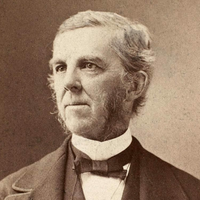The Smiling Listener
PRECISELY. I see it. You all want to say
That a tear is too sad and a laugh is too gay;
You could stand a faint smile, you could manage a sigh,
But you value your ribs, and you don’t want to cry.
And why at our feast of the clasping of hands
Need we turn on the stream of our lachrymal glands?
Though we see the white breakers of age on our bow,
Let us take a good pull in the jolly-boat now!
It’s hard if a fellow cannot feel content
When a banquet like this does n’t cost him a cent,
When his goblet and plate he may empty at will,
And our kind Class Committee will settle the bill.
And here’s your old friend, the identical bard
Who has rhymed and recited you verse by the yard
Since the days of the empire of Andrew the First
Till you 're full to the brim and feel ready to burst.
It’s awful to think of,—how year after year
With his piece in his pocket he waits for you here;
No matter who’s missing, there always is one
To lug out his manuscript, sure as a gun.
'Why won’t he stop writing?' Humanity cries
The answer is briefly, 'He can’t if he tries;
He has played with his foolish old feather so long,
That the goose-quill in spite of him cackles in song.'
You have watched him with patience from morning to dusk
Since the tassel was bright o’er the green of the husk,
And now—it ‘s too bad—it ’s a pitiful job—
He has shelled the ripe ear till he’s come to the cob.
I see one face beaming—it listens so well
There must be some music yet left in my shell—
The wine of my soul is not thick on the lees;
One string is unbroken, one friend I can please!
Dear comrade, the sunshine of seasons gone by
Looks out from your tender and tear-moistened eye,
A pharos of love on an ice-girdled coast,—
Kind soul!—Don’t you hear me?—He’s deaf as a post!
Can it be one of Nature’s benevolent tricks
That you grow hard of hearing as I grow prolix?
And that look of delight which would angels beguile
Is the deaf man’s prolonged unintelligent smile?
Ah! the ear may grow dull, and the eye may wax dim,
But they still know a classmate—they can’t mistake him;
There is something to tell us, 'That’s one of our band,'
Though we groped in the dark for a touch of his hand.
Well, Time with his snuffers is prowling about
And his shaky old fingers will soon snuff us out;
There’s a hint for us all in each pendulum tick,
For we’re low in the tallow and long in the wick.
You remember Rossini—you ‘ve been at the play?
How his overture-endings keep crashing away
Till you think, ’It 's all over—it can’t but stop now—
That ‘s the screech and the bang of the final bow-wow.’
And you find you ‘re mistaken; there ’s lots more to come,
More banging, more screeching of fiddle and drum,
Till when the last ending is finished and done,
You feel like a horse when the winning-post ‘s won.
So I, who have sung to you, merry or sad,
Since the days when they called me a promising lad,
Though I ’ve made you more rhymes than a tutor could scan,
Have a few more still left, like the razor-strop man.
Now pray don’t be frightened—I 'm ready to stop
My galloping anapests’ clatter and pop—
In fact, if you say so, retire from to-day
To the garret I left, on a poet’s half-pay.
And yet—I can’t help it—perhaps—who can tell?
You might miss the poor singer you treated so well,
And confess you could stand him five minutes or so,
‘It was so like old times we remember, you know.’
'T is not that the music can signify much,
But then there are chords that awake with a touch,—
And our hearts can find echoes of sorrow and joy
To the winch of the minstrel who hails from Savoy.
So this hand-organ tune that I cheerfully grind
May bring the old places and faces to mind,
And seen in the light of the past we recall
The flowers that have faded bloom fairest of all!


